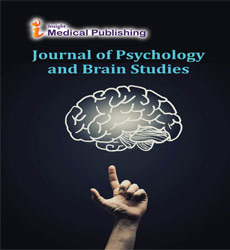Executive Functions and their role in Learning Disabilities
Human Sciences and Health Scientific Manager, Aegean College, Athens, Greece
- *Corresponding Author:
- Fotis Papanastasiou
Human Sciences and Health Scientific Manager
Aegean College, Athens, Greece
Tel: +30 6972 21 50 95
E-mail: fotispapanastasiou@hotmail.gr
Received date: September 29, 2017; Accepted date: October 05, 2017; Published date: October 10, 2017
Citation: Papanastasiou F (2017) Executive Functions and their role in Learning Disabilities. J Psychol Brain Stud. Vol.1 No. 3:17
Editorial
As executive functions are defined the higher cognitive functions which have as main role the supervision, control and regulation of behavior and emotions. We call them superior to separate them from basic cognitive skills of memory, visual perception, orientation and attention. The term "executive functions" was introduced by Pribram in 1973 to describe the functions of the pre-frontal cortex [1].
It is our ability to solve complex problems, to perceive our mistakes and to try to correct them, adapt our behavior according to social conditions, manage our feelings, process the information we hold on to the working memory, to manage our attention and concentration, to design and modify our behavior to achieve a goal.
It is not clear how many kids struggle with executive functioning issues [2,3]. The issues are not uncommon, though. They often appear in kids with ADHD and dyslexia, as well as other conditions. In fact, some experts believe nearly all kids with ADHD have symptoms of executive functioning issues.
Executive functions contribute significantly to the academic and social difficulties faced by students with learning disabilities. Thus, children with learning disabilities have difficulty controlling their impulses, organizing, prioritizing and coordinating the information they receive. Significant deficits are encountered in work memory, self-regulation and metacognitive skills. They also do not use effective learning strategies. The malfunctions, therefore, in executive skills significantly affect students with learning difficulties in their academic, psychological and social pathways [4-6].
The degree of improvement in executive functions depends on many factors such as the learner's educational profile, age, motivation and teaching techniques to be used. Executive functions are directly linked to self-regulation, that is our ability to observe, control and modify our behavior and feelings [7-9]. The more developed this skill is, the more easily we adapt to the conditions. Improvement of executive functions can only be achieved through a personalized and appropriately structured intervention program. According to recent studies there are 97 new areas in our cerebral that might help us understand the neuroscience of Special Education [10,11].
References
- Friedman NP, Miyake A, Young SE, Defries JC, Corley RP, et al. (2008) Individual differences in executive functions are almost entirely genetic in origin. J Exp Psychol Gen137: 201–25.
- Rebecca E (2003) Executive functions and their disorders. Imaging in clinical neuroscience. Oxford Journals 65: 49–59.
- Virginia A (2013)Diagnostic and Statistical Manual of Mental Disorders. 5th ed. American Psychiatric.
- "What Is Attention Deficit Hyperactivity Disorder?" NIMH.nih.gov. National Institute of Mental Health.
- Bull R and Gaia S (2001)Executive functioning as a predictor of children’s mathematics ability: Inhibition, switching, and working memory.Dev Neuropsychol19: 3.
- Larry S(2001) Learning disabilities and executive dysfunction in boys with attention-deficit/hyperactivity disorder. Neuropsychology 15: 544-556.
- "Fetal alcohol syndrome: Definition." MayoClinic.com. Mayo Foundation for Medical Education and Research, 21 May 2011.
- Robison LL (2011)Late effects of acute lymphoblastic leukemia therapy in patients diagnosed at 0-20 Years of Age.Hematology Am Soc Hematol Educ Program. 1: 238–242
- Glasser MF, Coalson TS, Robinson EC, Hacker CD, Harwell J,et al. (2016) A multi-modal parcellation of human cerebral cortex. Nature 536: 171–178
- Papanastasiou F “Learning Abilities” Intervention and Support Program for Learning Disabilities.
- EidikosPaidagogos – web: www.eidikospaidagogos.gr.
Open Access Journals
- Aquaculture & Veterinary Science
- Chemistry & Chemical Sciences
- Clinical Sciences
- Engineering
- General Science
- Genetics & Molecular Biology
- Health Care & Nursing
- Immunology & Microbiology
- Materials Science
- Mathematics & Physics
- Medical Sciences
- Neurology & Psychiatry
- Oncology & Cancer Science
- Pharmaceutical Sciences
